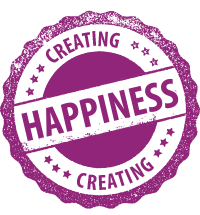In order to be able to regulate our emotions effectively and be successful in building healthy, resilient thinking patterns, we first need to build a healthy foundation of positive life skills.
It’s like preparing the ground of a garden, so plants can thrive. Without a good flower bed, plants cannot thrive and there will be only a meager harvest. My wish for you is to have an abundant life, with an abundant harvest. If you want the same, read on!
The developer of Dialectical Behaviour Therapy (DBT), Dr. Marsha M. Linehan, has an acronym for that solid life foundation, that she calls “PLEASE” skills. I find that really useful, so I would like to share that with you. I will use it as a rough structure and add my thoughts to it:
1. Treat physical illness.
Take care of your body and see a doctor if necessary, take prescribed medication on time.
We are one big interconnected system – body, mind, and emotions – and if the body is sick, it will very likely impact your emotions and thought patterns negatively. Taking care of illness is an important first step in building a solid foundation.
2. Eat a healthy diet.
Eat regularly and mindfully throughout the day. Treat your body to the highest quality of food that you can afford. Try to stay away from foods that can wreak havoc on your emotions in large quantities, such as sugar, refined carbs, and caffeine.
When you eat, I invite you to put your phone, or any other distraction, away. Treat yourself to a mental break and allow yourself to connect fully to that moment, leaving fears of the future and regrets of the past behind.
The easiest way for me to connect to the present moment, is to consciously engage all my five senses by asking myself, “What am I seeing right now?”, “What am I tasting right now?”, “What am I hearing right now?”, “What am I smelling right now?”, and, “What am I touching right now?”
After having connected with my senses, in order to deepen my mindful state, I like to say out loud (and, if I am not alone, say to myself internally), “I am here, and this is a precious moment, I want to live and enjoy it fully”.
This way, each meal can become a little retreat from the craziness of life. I invite you to try it! It is amazing how much better food tastes – or really any moment is – when experienced mindfully. It is like moving from a black and white image to a technicolor experience.
3. Be smart with mood-altering substances
If you choose to drink alcohol or smoke for recreation, consider doing so only in moderation. As soon as any substance is used regularly beyond enjoyment as a way to escape difficult emotions – that is as a way to “not feel the pain” – the risk of addiction increases significantly.
If you feel a consistent pull towards numbing your emotions through mood-altering substances, find a therapist and explore what is going on inside of you. Most likely, the very emotions you don’t want to feel, are important messengers, like an internal GPS system. Giving them space will be the first essential step required to make healing possible.
Stay away from illicit drugs, their potential for harm is enormous. And while certain drugs like marijuana may be legal in your country, this does not mean that they are harm-free, especially on young brains that have not finished developing.
4. Prioritize sleep – adults usually need 7-9 hours per night.
If you need less than that and can function optimally the next day, you are an exception and I envy you ? The goal is to get enough sleep to wake up the next morning feeling rested.
If you have difficulty sleeping, it can be very helpful to keep a regular schedule and have a sleep routine that allows you to wind down at the end of the day (eg: no blue light exposure, dimmed light, soft music, calming atmosphere, warm bath).
5. Get exercise regularly.
Cardio-vascular exercise releases endorphins in our brain, which is nature’s “feel-good chemical”, a natural antidepressant. Aim to work out at least three times a week for 20 minutes. The goal is to keep your heart rate elevated during that time and be out of breath.
However, if that is too ambitious for you at this point, start with a 10-minutes swift walk around the block and increase it from there. Anything is better than nothing!
Remember the key is consistency and building a habit. If you are able to repeat the behavior for 30 days in a row, there is a very good chance you will be able to keep it in place for a long time. Stay the course, you can do it!
If you have difficulty implementing new habits, up the ante! In her new book Everything Is Figureoutable, Marie Forleo suggests a fun way of putting skin in the game. She invites you to go online and search for accountability apps + [the current year], which will lead you to a variety of options with a wide array of features.
Next, you determine the financial fine you are willing to pay each time you don’t stay on track. Some apps even allow you to determine what will happen with the money you lose. I was laughing out loud when the author said, “You can [even] have the cash sent to your nemesis or to an anti-charity – a cause or an organization you can’t stand. That’s taking loss aversion to the next level”.
Damn right it is! I intend to try that technique out asap and invite you to join me.
Note: Please speak to your doctor before starting any new exercise program, especially if you have a medical condition or have not been active for a long time.
6. Having a healthy work-life balance.
What I would add to those DBT skills is the importance of having a healthy work-life balance. My experience working with people is that many of us are way too thinly stretched. Often there are one or two parents with demanding jobs, children clamoring for attention, the romantic relationship suffering, demands never-ending, feeling like you are on a hamster wheel, no end of relief in sight.
If you want to be emotionally and mentally well, you need to become intentional and stubborn about downtime and protect it! Possibly, you could block out chunks of time each week that you can then use whatever way you want, so you can regain strength and energy and focus on what really matters to you.
For example, for me, one step in the right direction has been to commit to only one activity on the weekend, and keep the other day free, for me to rest or do whatever I feel like doing. This way, my life feels more balanced and I am more likely to feel ready again to re-engage with life when the week starts.
A foundation of positive life skills is key in allowing you to regulate your emotions, have healthy and positive thinking patterns, and experience overall life satisfaction.
Being intentional about building this solid foundation is a prerequisite to being able to explore your full potential, to see how bright you can shine, how high you can soar. It opens up the possibility of experiencing a harvest spilling over, which is my very wish for you. May you prosper in all ways you long for and live an abundant life.
Reference: DBT Skills Training Handouts and Worksheets, Second Edition, by Marsha M. Linehan.
Everything Is Figureoutable by Marie Forleo (2019)

This post is part of the blog series "Creating Happiness", your inspiration to promote positive change in your life.
Do you like Daniela's posts? Subscribe to her blog series:
ABOUT THE AUTHOR
Ms Daniela Beer-Becker, Psychologist
Daniela is a regular contributor to the Blake Psychology blog and author of the "Creating Happiness" series.
MORE POSTS IN THE SERIES
















